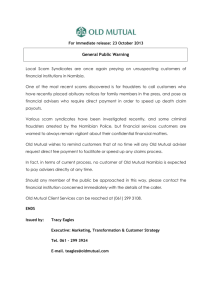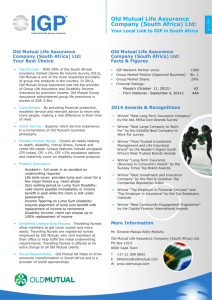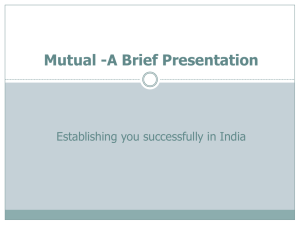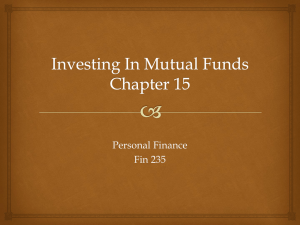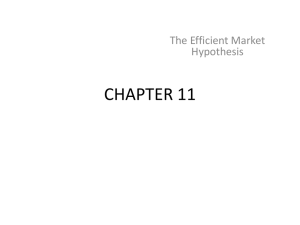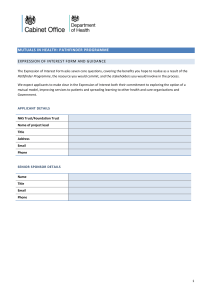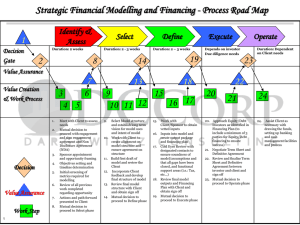Why and how we became a mutual
advertisement
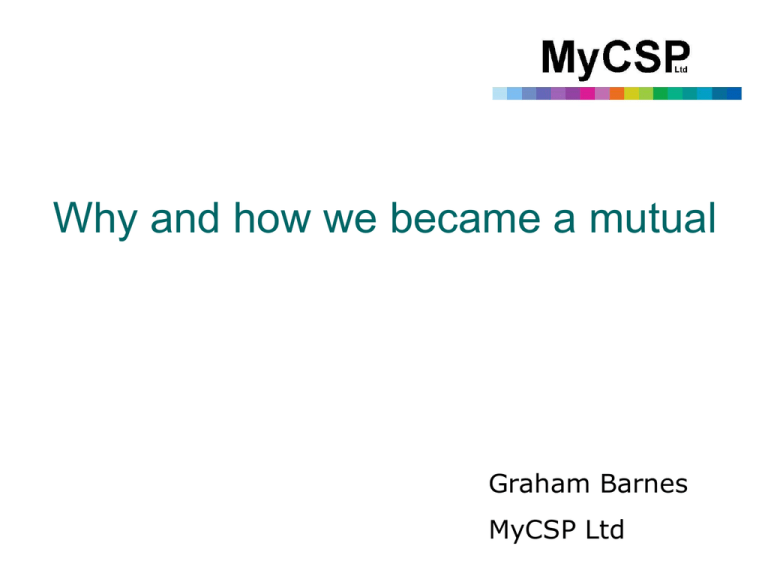
Why and how we became a mutual Graham Barnes MyCSP Ltd Why become a mutual? Better services (happier customers and employees), lower costs, agility, resilience, better governance, greater direct engagement. Mutuals are innovative organisations at the centre of the Government’s reforms to public services, with the aim of bringing about a transformation in the lives both of those who use and rely upon public services, and of those who provide and work in them; Mutuals can be directly beneficial for their employees, with higher well-being, lower staff turnover and absenteeism than their competitors, and for the users of the service they provide, offer a higher quality service with superior customer satisfaction; and Offer the opportunity to address issues in other ways than the traditional binary choice between In-house provision (control) and straight outsourcing (costs) How do you go about setting one up? First you must decide what you are setting up and why! MyCSP didn’t start with the answer = a Mutual Joint Venture – it started with trying to understand the problems/opportunities facing MyCSP and a challenge to improve further and faster than we originally planned. The ‘Process’ Understand the Problem Define the Outcome Work out what is needed and how to get there Extensive employee and stakeholder engagement throughout (Align the influencers and decision makers, and engage directly with employees) Get on with it as quickly as you can! The MyCSP Journey Early work established MyCSP as a unified body supported by greatly simplified governance arrangements However, the change of Government and deteriorating economic climate have brought major new challenges… Budget deficit reduces available investment funding Civil Service resizing has resulted in a long term increase in demand for services Changing pensions landscape including Hutton review, 2012, Compensation scheme changes etc My CSP Greater appetite to engage the private sector to accelerate the pace of change Opportunity to align with new policy initiatives such as “mutualisation” From a “long list” of potential strategies and delivery models we settled on three broad options Models & Strategies Gov Department Outsource Joint Venture Co-Source Mutual Trading Fund Co-Operative GovCo Options Considered A Revised In-House model retaining My CSP as a Departmental function, contracting a private sector partner to accelerate transformation and buying the core software “as a service” A traditional Outsource of the service letting the provider complete transformation, deal with scheme changes and deliver the operational service A Partnership approach that positions My CSP as a commercial joint venture with a private sector partner providing capital and capability with a retained interest for Government and a mutual interest for Members and Employees Once we decided what, we… Set up a programme team Set up the legal company framework and implemented the governance arrangements (Board / Exec Team / Employee Partnership Council / Trustee Board) Launched the competition to secure a private sector partner Launched the negotiation of a full commercial service contract Revised the legal company framework to reflect the shift to full mutual joint venture The launch of MyCSP Ltd MyCSP Ltd was launched on 1st May 2012, following an 18 month strategic programme. Within the programme the management team of the Cabinet Office function responsible for the administration of Civil Service Pensions worked with a PwC team, appointed as strategic transformation partners. The programme created the MyCSP Ltd statutory entity, created the mutual aspects of the organisation, and the related employee ownership provisions, built a “stand alone” business and, in parallel, established all of the commercial arrangements with: • Government as Customer • Government as transferor and owner • Government as supplier • A private sector partner as owner and supplier, and Third party providers

